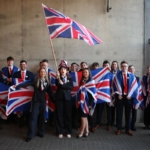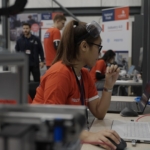At WorldSkills UK, our mission is to help all young people go further, faster, in their careers. Our work with our partners in business, education and governments gives the next generation the skills they need to reach their full potential. And we need to ensure that all young people, from all backgrounds, get the same chances to succeed through our skills development programmes.
But currently that isn’t the case – and we want to find out why, for example, our development programmes attract fewer young adults from ethnic minority backgrounds and we remain gender-segregated in terms of skills. That’s why we have recently launched a ground-breaking research project that aims to do just that. Working with key partners and diversity experts, and supported by The Social Innovation Partnership, we have begun to explore and understand the barriers faced by underrepresented groups entering WorldSkills UK competitions.
The research will focus on several groups: young adults from disadvantaged backgrounds; young people from Black, Asian or Minority Ethnic (BAME) backgrounds; young women taking STEM subjects, ICT and construction; young adults with special educational needs and disabilities; and young people who identify as LGBT+. Through both qualitative and quantitative data analysis from past competitors, partners and young people and by taking an intersectional approach – acknowledging that protected characteristics can be interconnected – we will seek to understand how to open our work up to more and more young people.
Leading by example & ensuring lasting positive change
To help us do that, we have set up an advisory group of leaders who are passionate about increasing diversity and inclusion in the skills sector. The group brings a wealth of expertise, lived experience and includes our own alumni. During our first meeting, it was noted that the moral imperative for this work – although clear – is not sufficient to ensure lasting, tangible success. Building a strong business case and learning from previously successful change programmes would help us ensure long-term benefits.
When discussing the business case for change, the group started by acknowledging that diverse teams have, time and again, been proven to improve performance – in sport as well as other walks of life, like business.
[1] So it was proposed that ultimately if WorldSkills UK wanted to not just maintain, but also improve on its top ten position at global WorldSkills competitions – against ever stiffer competition from other countries – we need the highest performing team possible, comprising the very best UK talent. Achieving this means helping ensure that as many young people as possible, from all backgrounds, have the opportunity to engage in our work and have the opportunity to make it all the way to UK national and international finals.
The Group also noted that while there have been many successful diversity and inclusion initiatives in recent years, there are also many failed attempts at ensuring long-term change. So we discussed three ways through which we hoped our research project would translate into sustainable change. Firstly, we are using a data-driven approach to understand our current position and determine what ‘success’ means to WorldSkills UK. Secondly, we will gather as much evidence as we can on the lived experiences of our competitors and other young people, to help us understand how we can improve our programmes to benefit as many people as possible. Thirdly, we will engage our partners. The ecosystem that makes our work a success is made up of a myriad of partner organisations including governments, businesses, colleges, training providers, universities and individuals. We must work with our partners to ensure that our research findings – and subsequent actions – are translated into real, meaningful change at all levels by setting ambitious but achievable goals.
As we continue on this project, I am positive that WorldSkills UK and our partners have the passion, knowledge, experience and determination to make a real difference to the lives of so many more young people.


